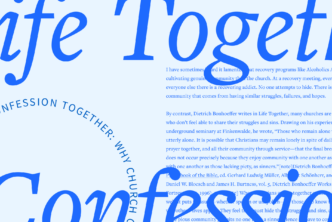Tools like Faithlife.com, a digital home for your faith community, and the Faithlife Study Bible harness technology to grow your faith. But for every edifying use of technology, a sinister one can also be found. This guest post by Luke Gilkerson, general editor of Covenant Eyes’ Breaking Free Blog, addresses some of the keys to Internet purity. Gilkerson is also the author of several books on Internet purity.
Somewhere in the world right now, a mother is discovering that her 14-year-old son has been looking at porn online for three years, and she was totally unaware up until now.
Somewhere else a man sits quietly in his home, engaging in a three-hour porn binge while his family is sleeping.
In another place, a single 25-year-old woman is clicking back and forth between porn videos and anonymous erotic chat sessions.
Next door, a pastor is sitting up late with his laptop, with his mouse arrow hovering over the words “I am at least 18 years old,” praying to God he will have the strength to resist the urge.
These are the kinds of stories I hear every day where I work at Covenant Eyes. Men and women call us day in and day out asking the same question: how can I resist temptation online?
I have come up with what I believe are three keys to success.
1. Know your helplessness
It is a step we often miss, but it is critical: we must cry out to God for help. God promises to be near to all who call on Him in truth (Psalm 145:18). To really “cry out” to God means we must first feel a sense of our own desperation. It is the brokenhearted (Psalm 34:18) and the humble (James 4:6) who receive God’s grace and nearness.
Crying out to God does not mean stewing over our sin in our minds. Nor is it just complaining about our sin or wallowing in self-pity. Crying out to God is about lifting our souls to Him and pleading with Him for help.
For many people who struggle with porn, there’s a desire to get to a place where they feel they don’t need to lean on God as much. These people believe freedom is about being strong enough to resist temptation. These people believe “growth” in the Christian life is about graduating from grace and becoming more self-reliant. In reality, growth is the exact opposite: it is about becoming more reliant on God, realizing our need for grace every minute of every day.
2. Know who you really are
Still living with our fallen bodies in a fallen world, we are weak, but we are no longer defined by our sin. As Christians, we have a new identity.
The apostle John says that those who are truly motivated to purify themselves are motivated by hope. “We know that when he appears we shall be like him, because we shall see him as he is” (1 John 3:2). This is our ultimate hope: the day Jesus returns and remakes us completely in His image, full of purity. This is our destiny.
Until then, we rest in the fact that we are already God’s children. “See what kind of love the Father has given to us, that we should be called children of God; and so we are” (1 John 3:1). We are God’s children, and one day that new identity will be put on display for all to see. “Everyone who thus hopes in him purifies himself as he is pure” (1 John 3:3).
For the porn lover, this means reckoning within our own minds that we are in fact dead to the sin of lust and alive to God, even if our lives don’t reflect it yet (Romans 6:11). We are united to the One who is dead to this sinful world, who lives in perfect, resurrection life (Romans 6:1–10). We have the Spirit of the resurrected Christ within us, and though that Spirit he marks us as His own. Because He is dead to the slave master sin, we too are dead to sin: we now have the freedom to obey God. We must reckon that to be true.
3. Know the power of accountability
Nothing destroys the sense of our true identity like a double life. The Internet offers that to us. It promises us an “anonymous” browsing experience where no one has to know about what we see, who we talk to, or what we do—including God.
Paul links sexual sin to secrecy. He says the works of darkness—sexual immorality, impurity, and covetousness—are done “in secret” (Ephesians 5:12) and “darkness” (Ephesians 5:11) because the light exposes us for who we really are. When we allow secret corners to develop in our lives, we are carving out a fantasy world of our own making—a place where God’s rules don’t apply to us, where our decisions are our own.
This is why we need accountability: we need the regular discipline of talking to others we trust about our temptations, sins, and the state of our hearts. We must practice nonsecrecy.
For the porn user, this is why accountability software is so powerful: it demolishes secrecy. It does not allow sin to fester in the dark.
***
The Faithlife Study Bible puts the world’s largest study Bible on your mobile device for free, so in moments of temptation, the scriptures will be close at hand. Download it today from your favorite app store.





